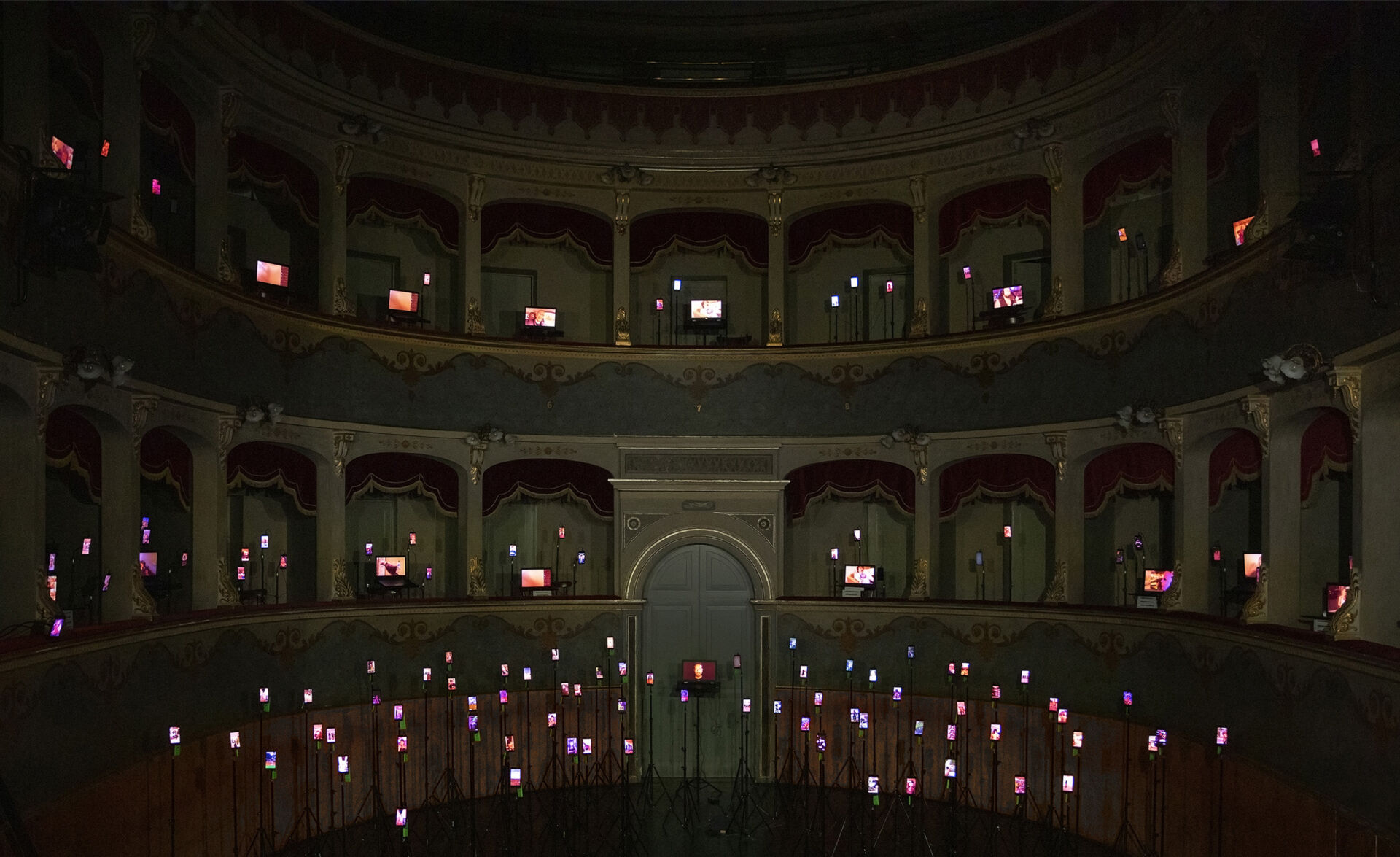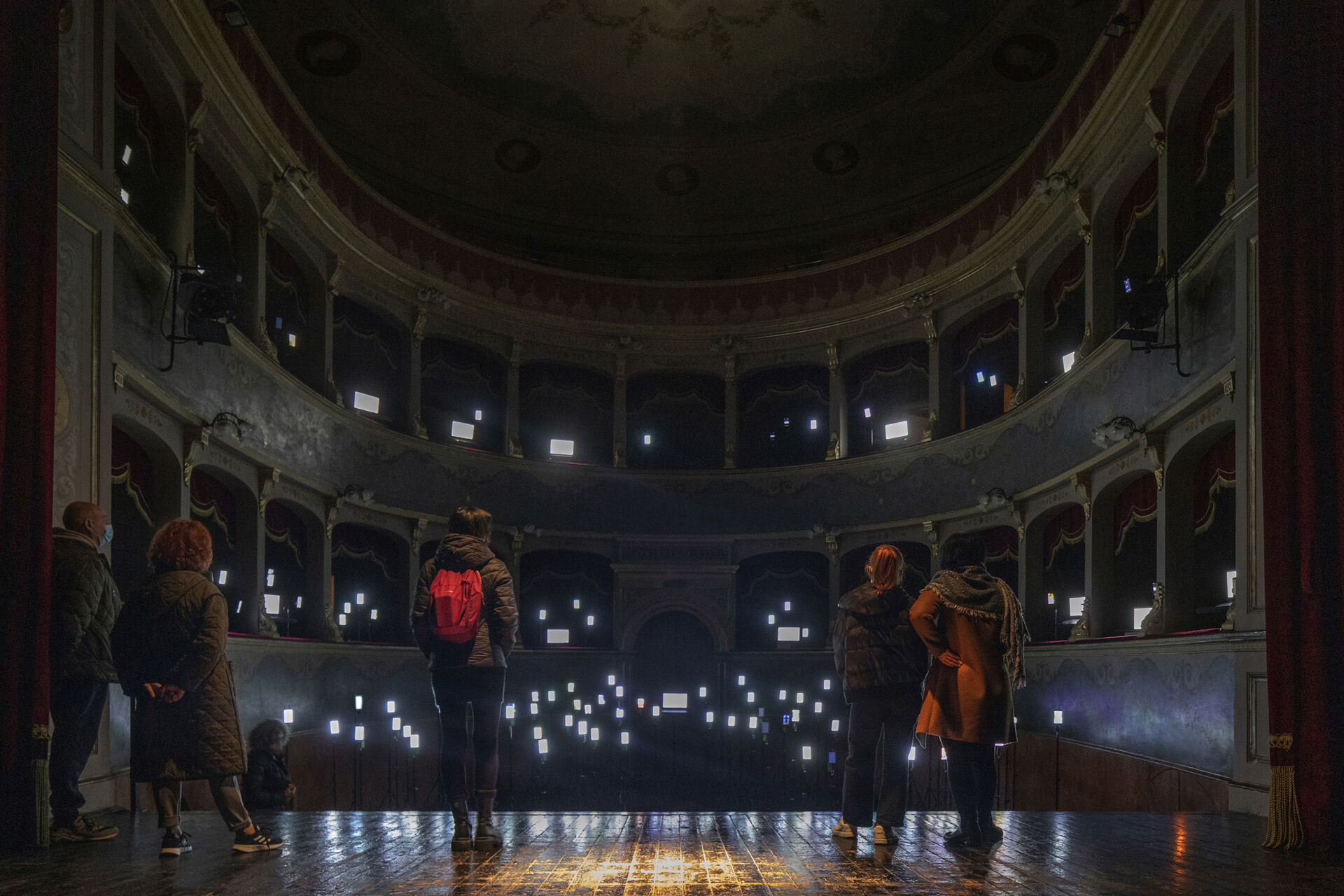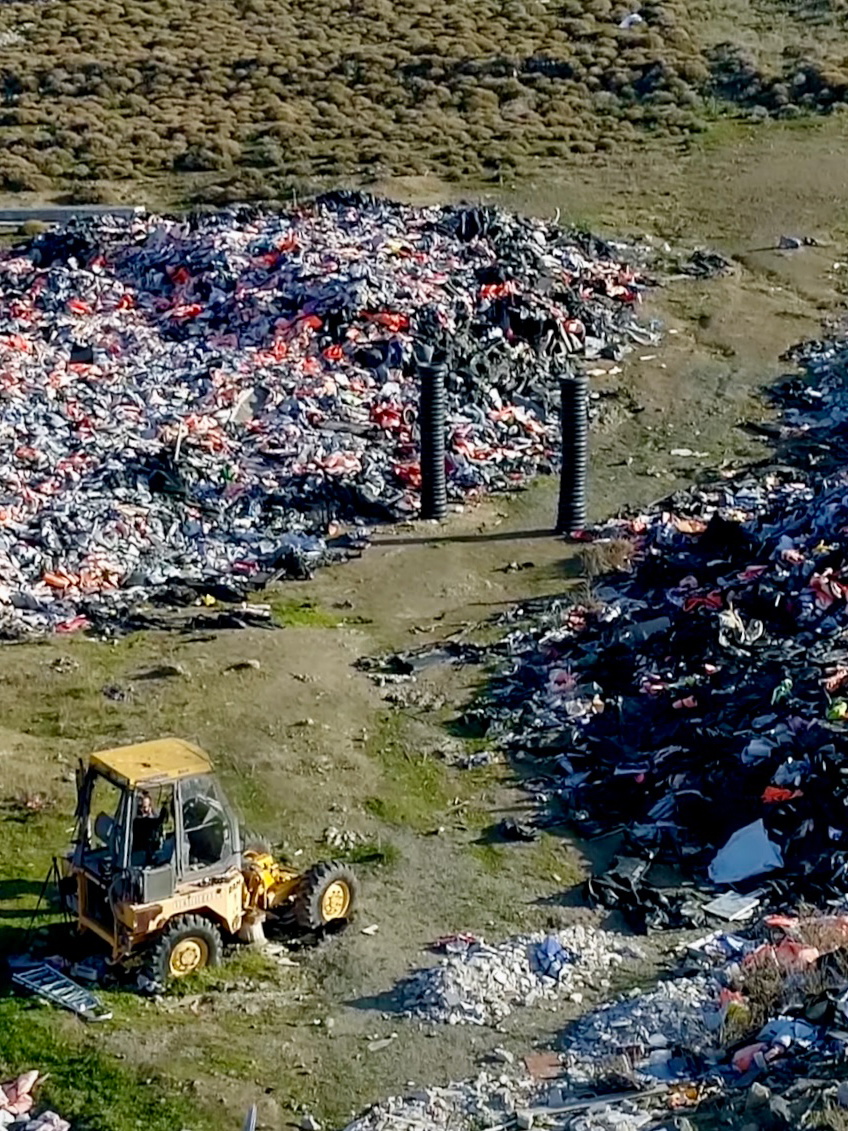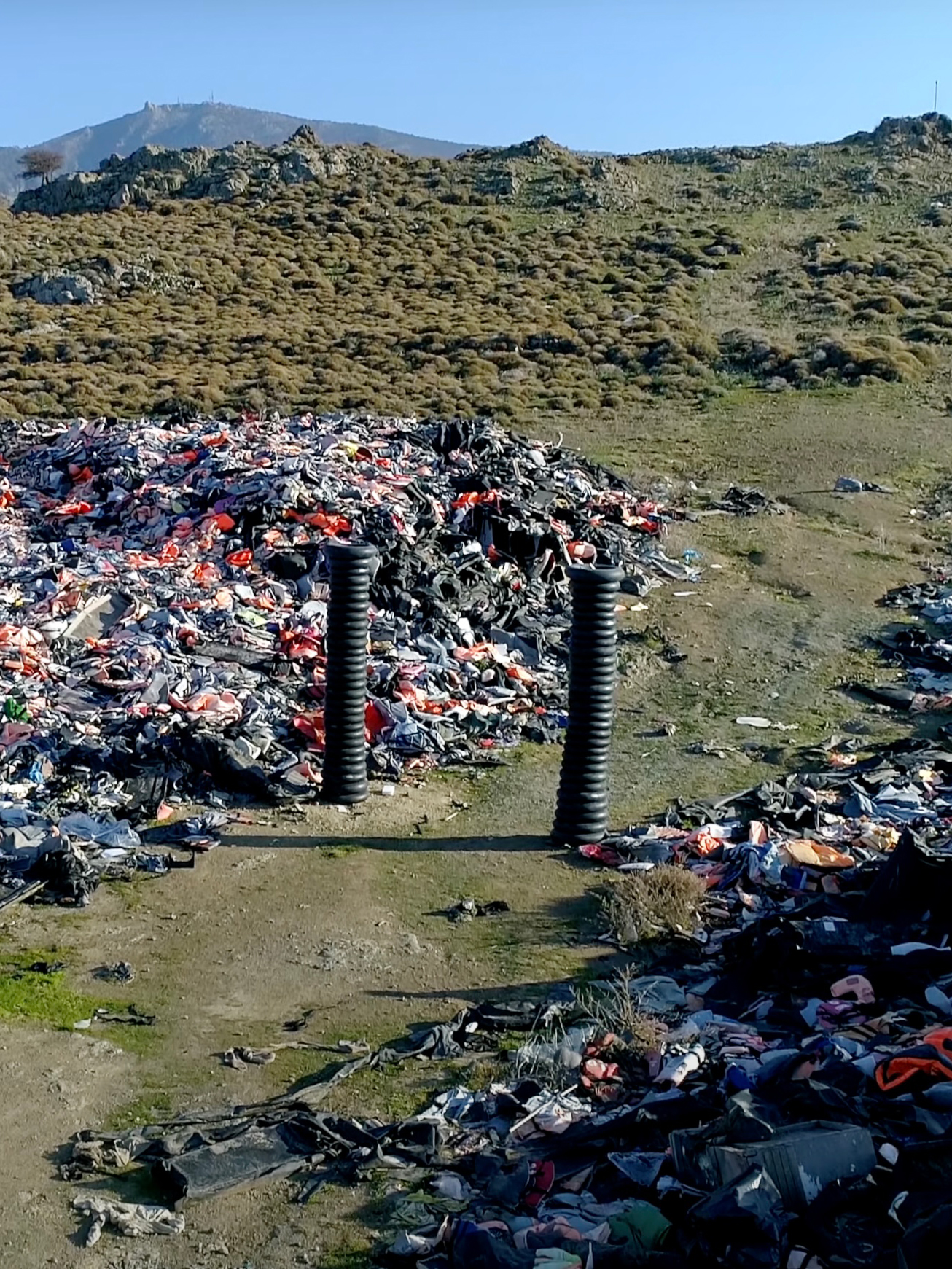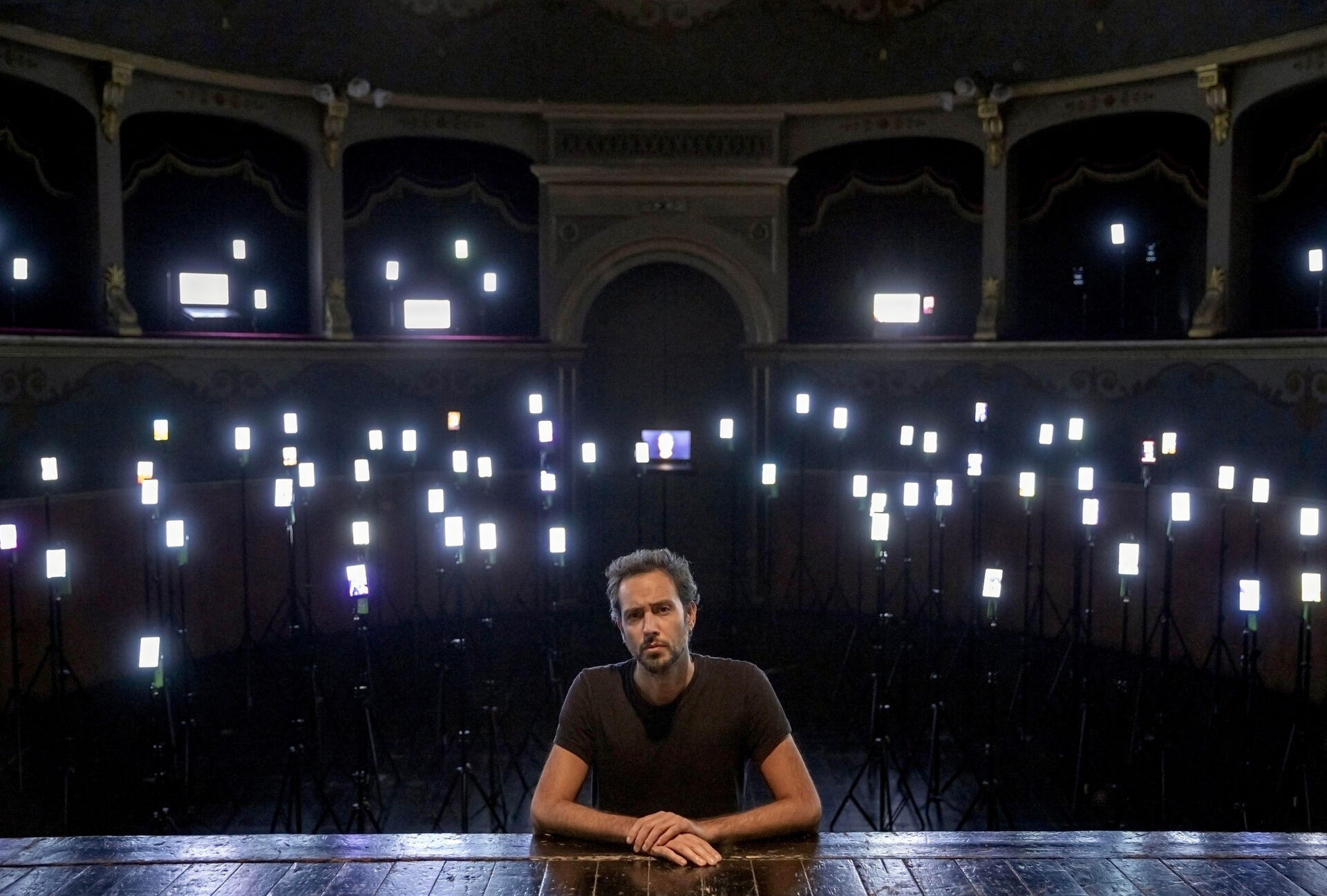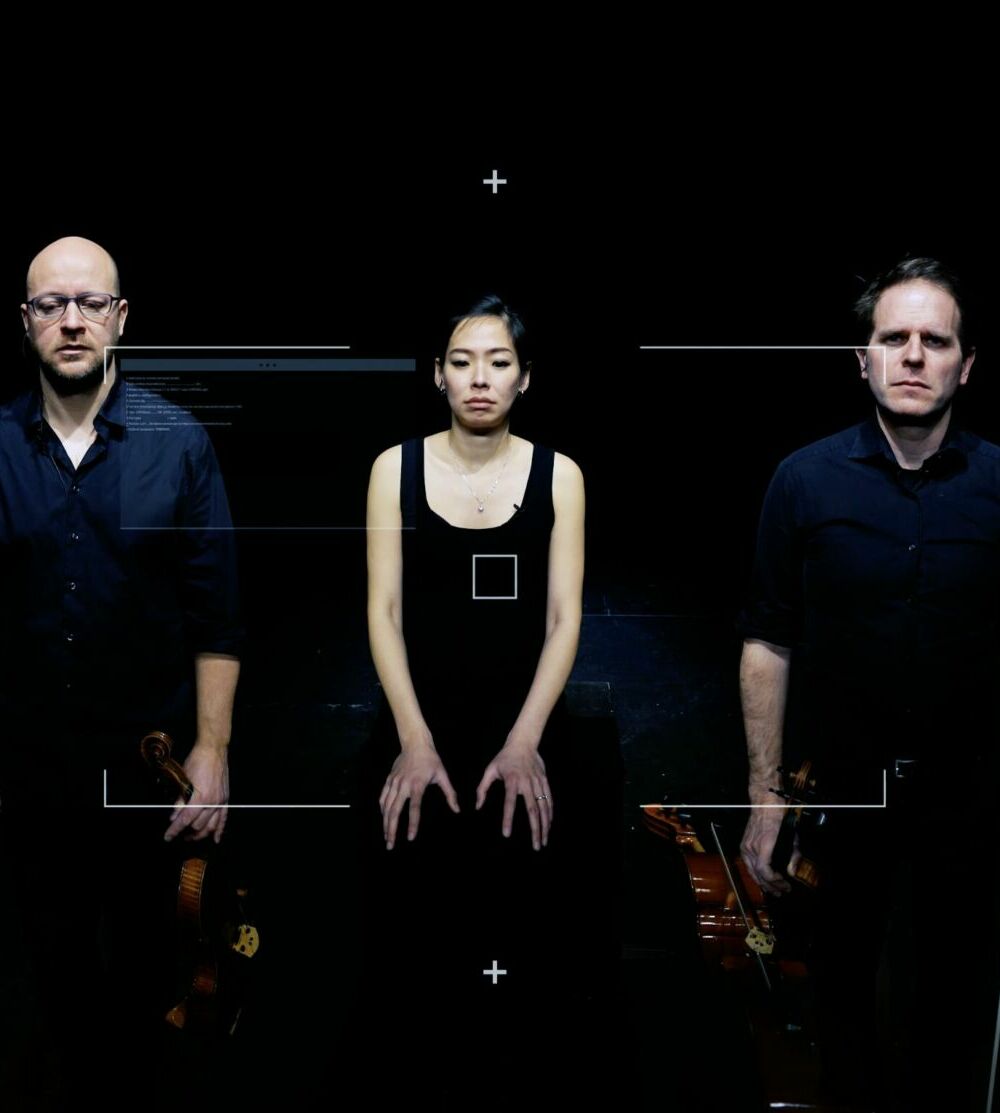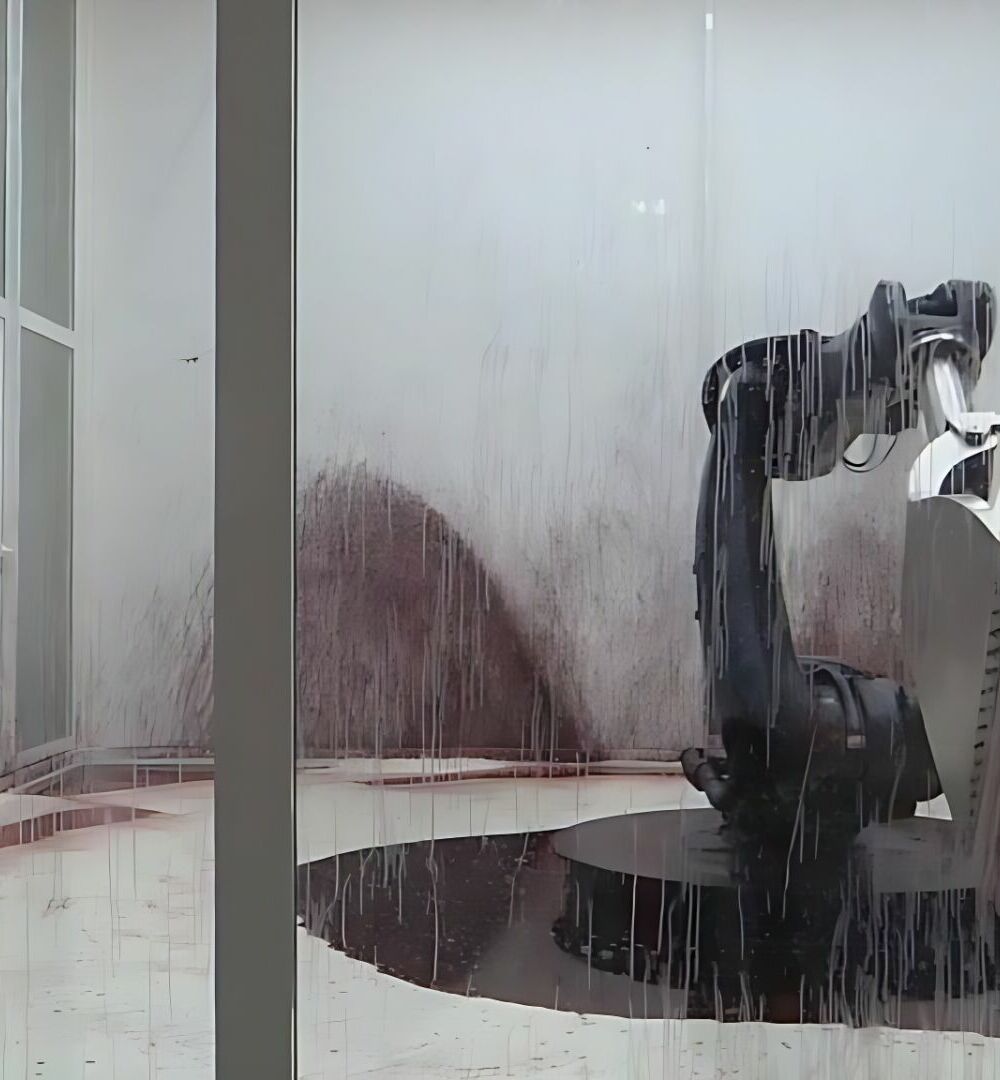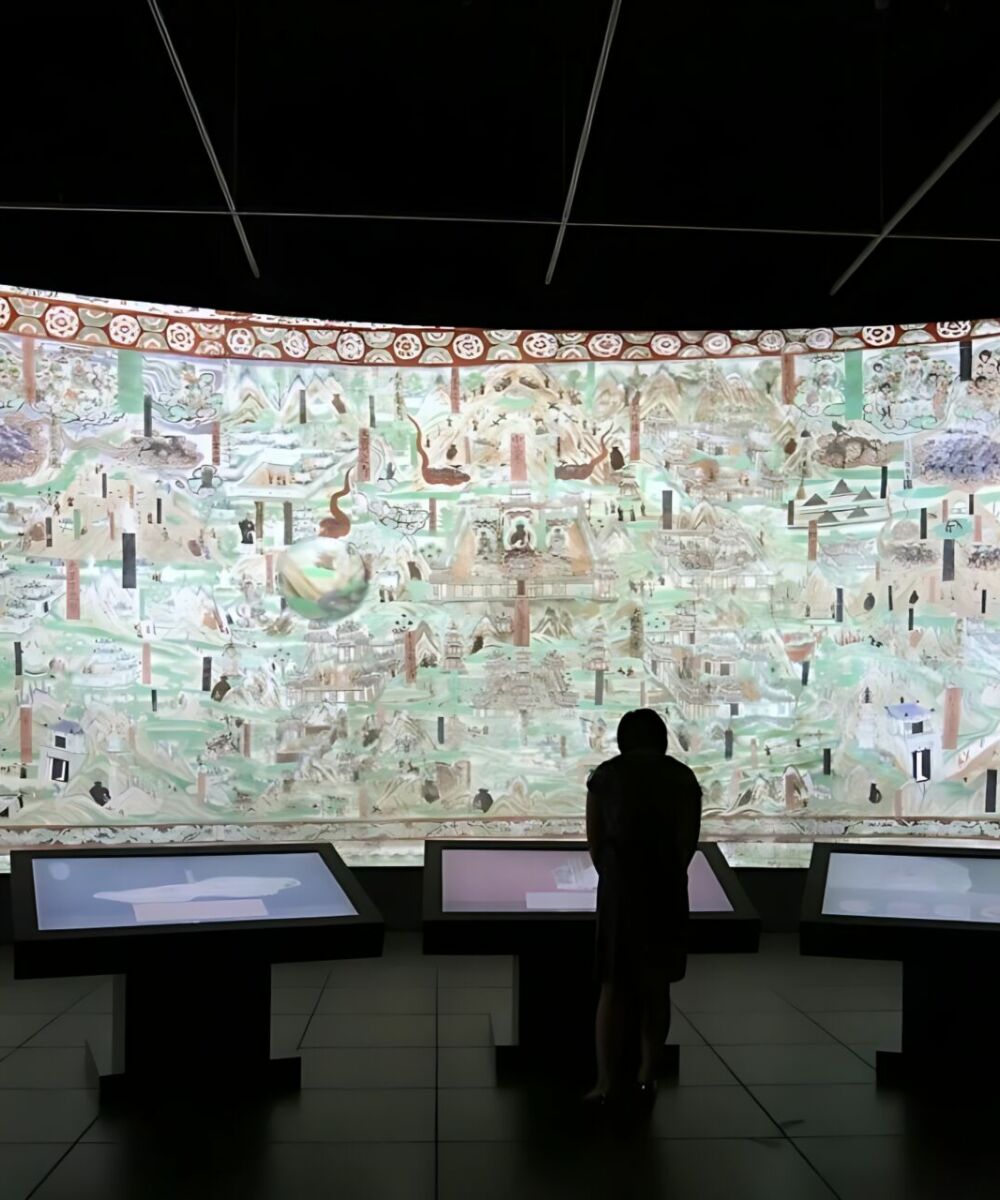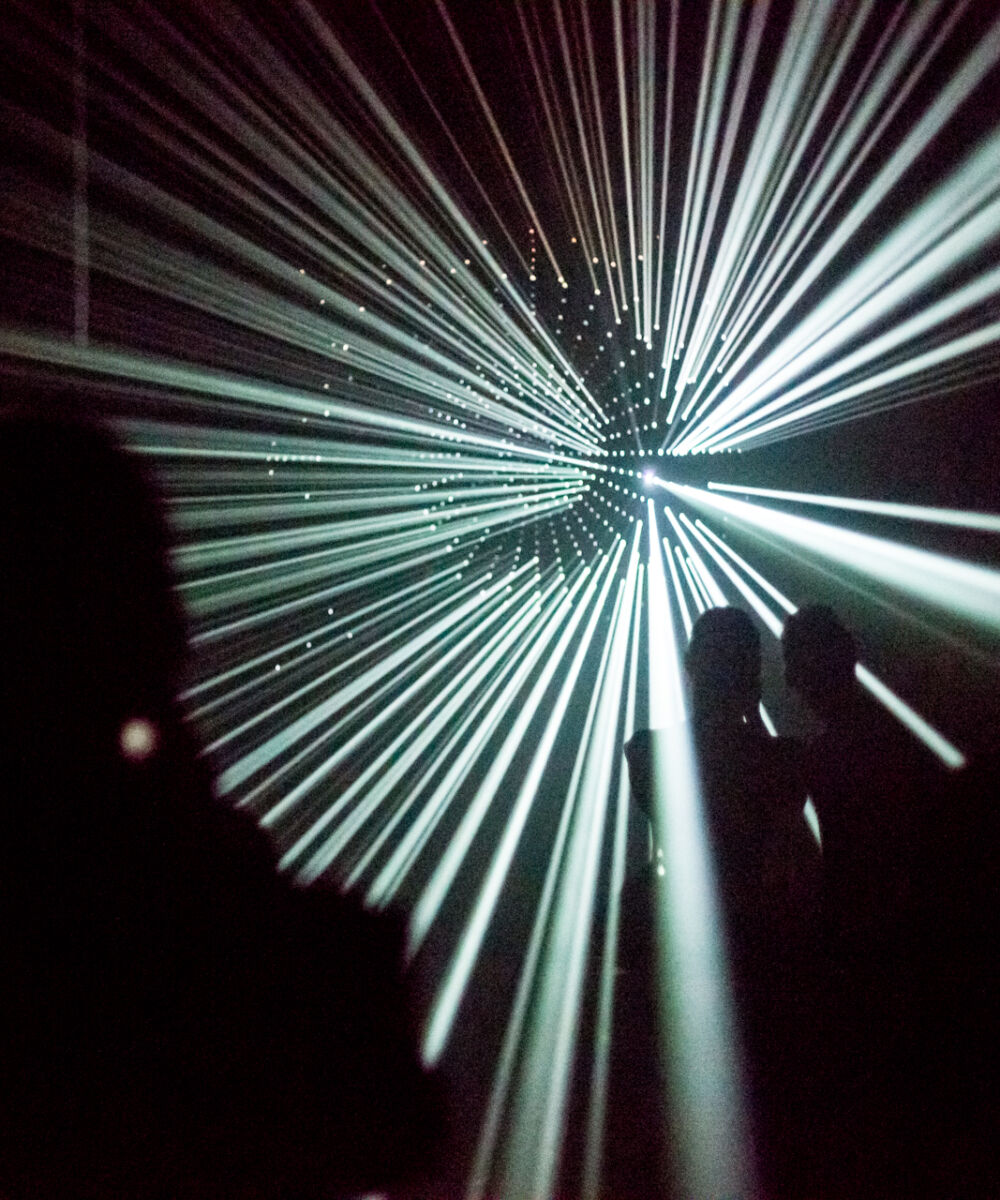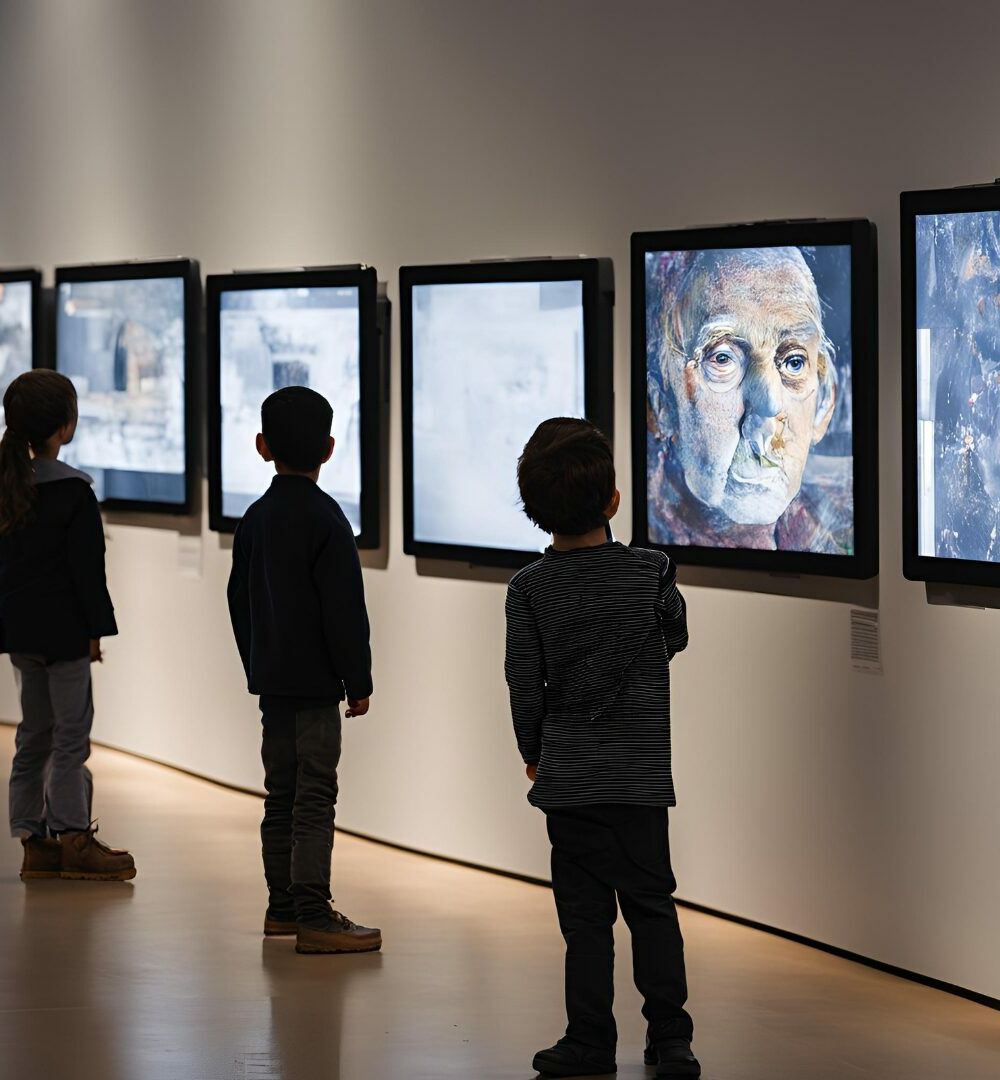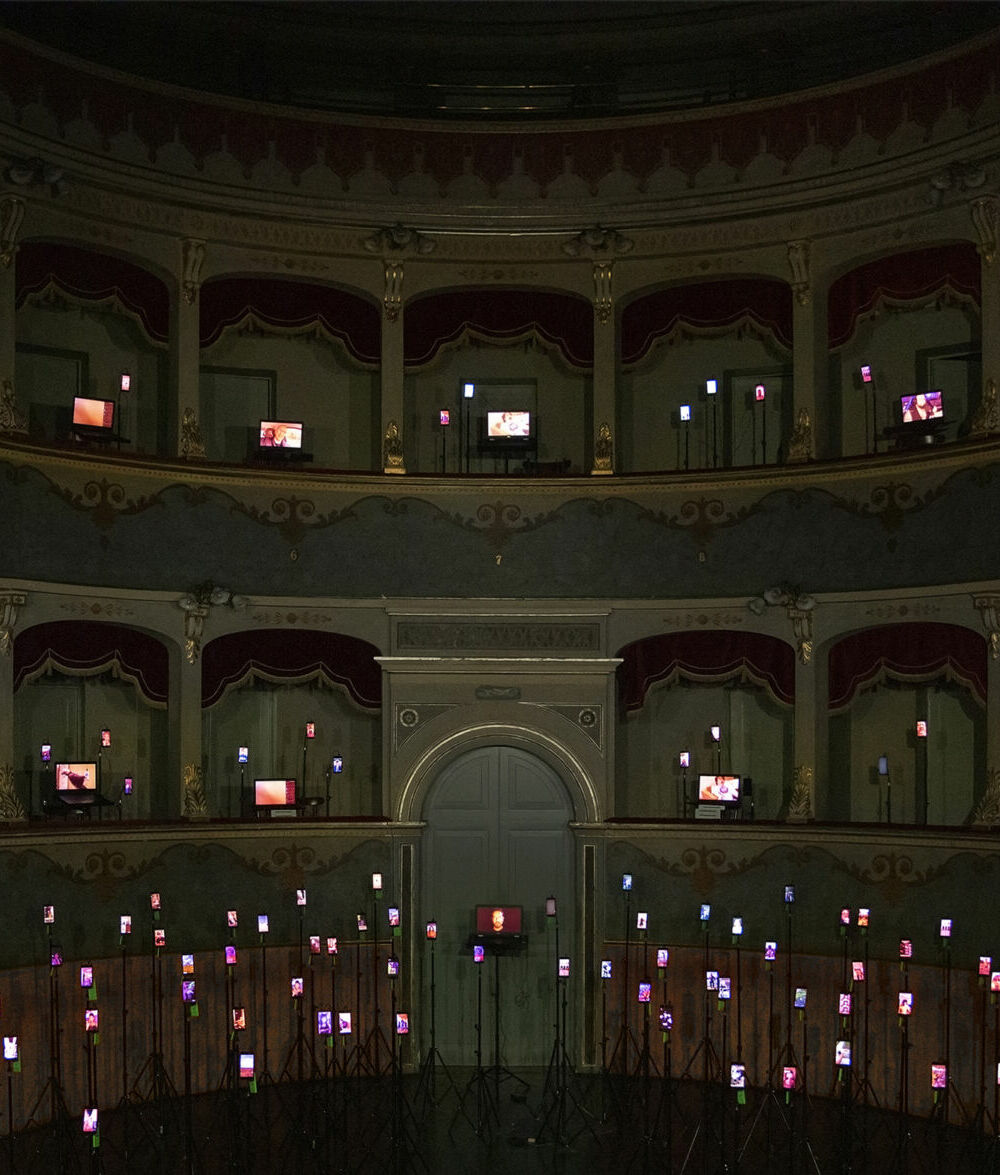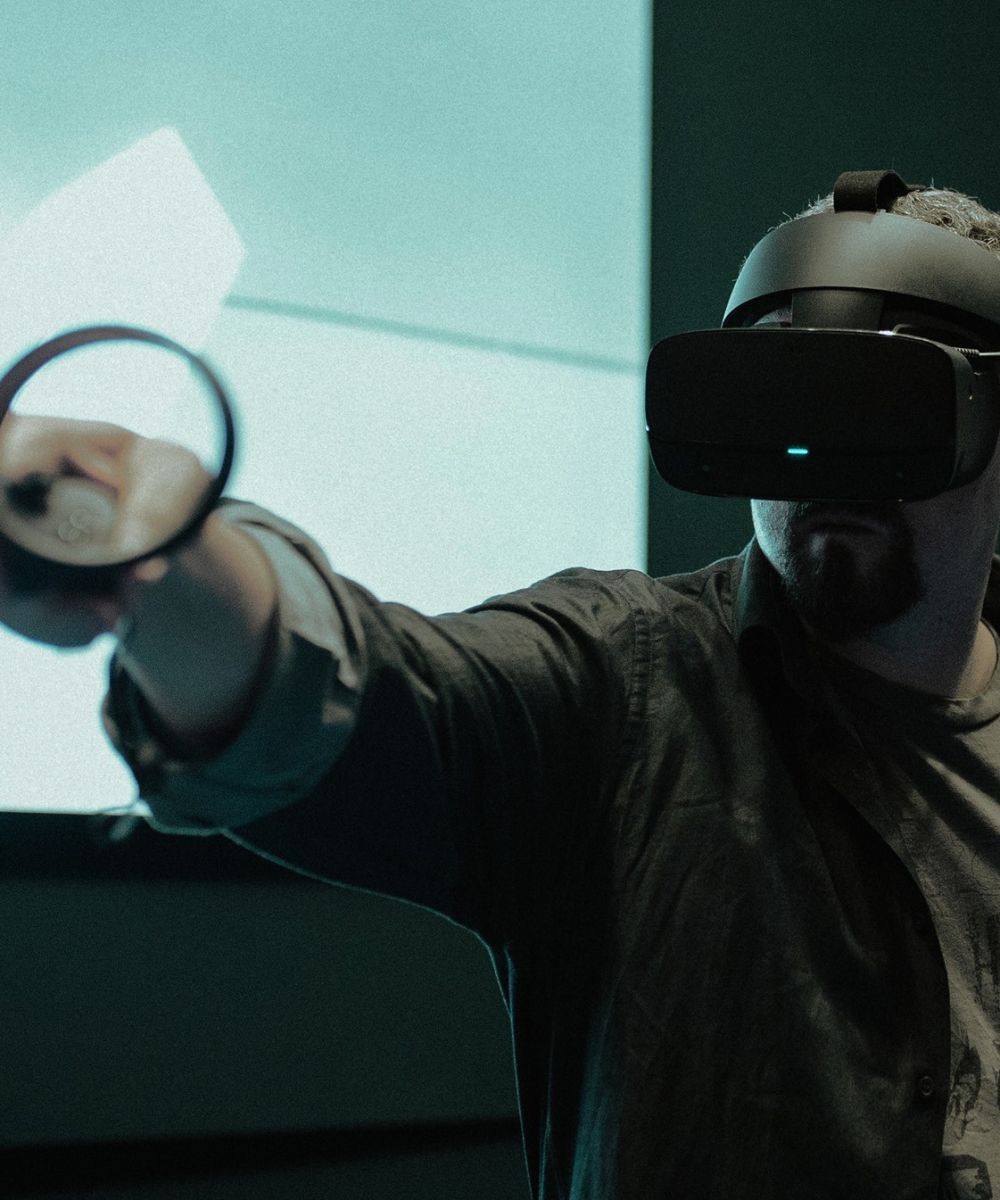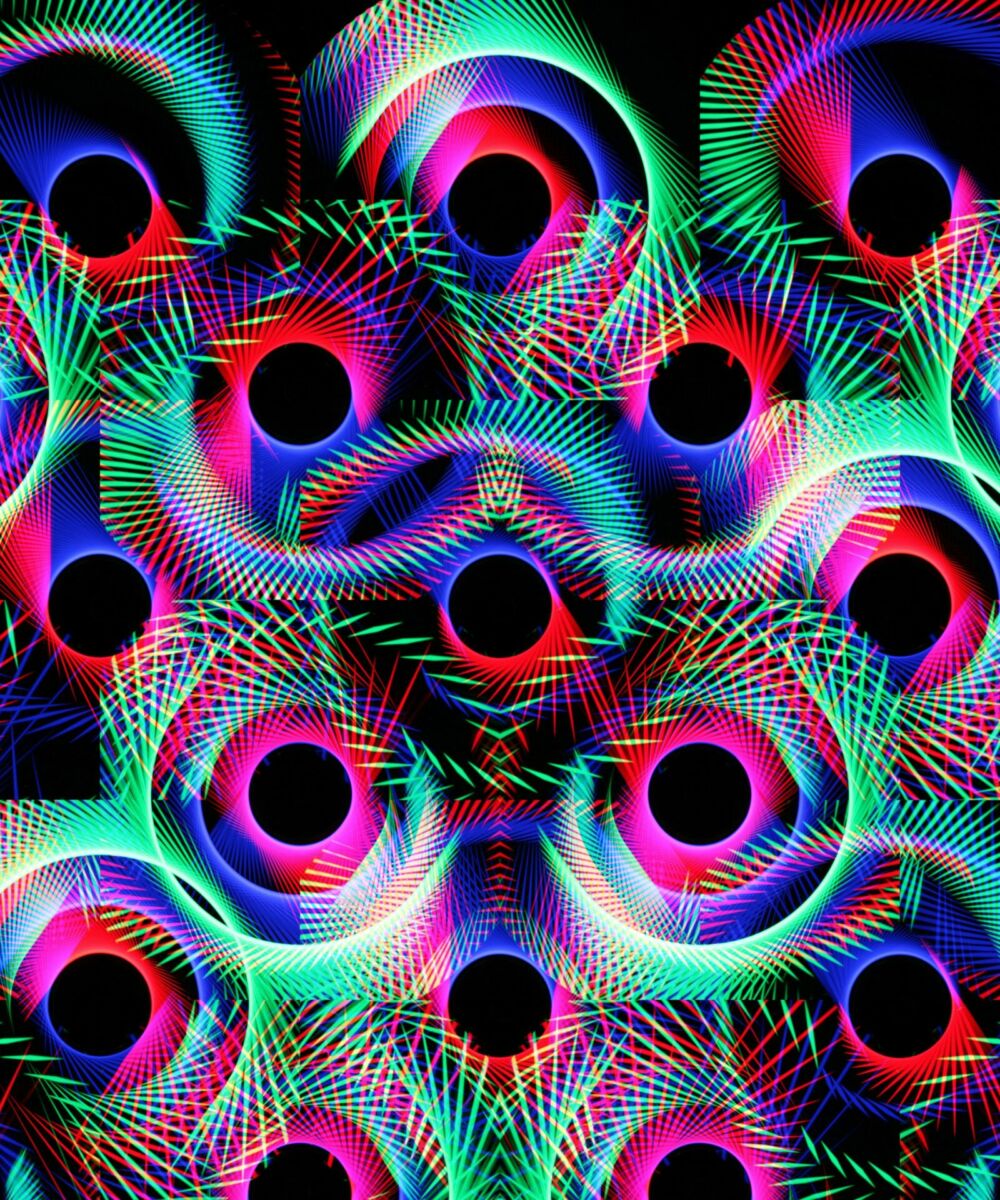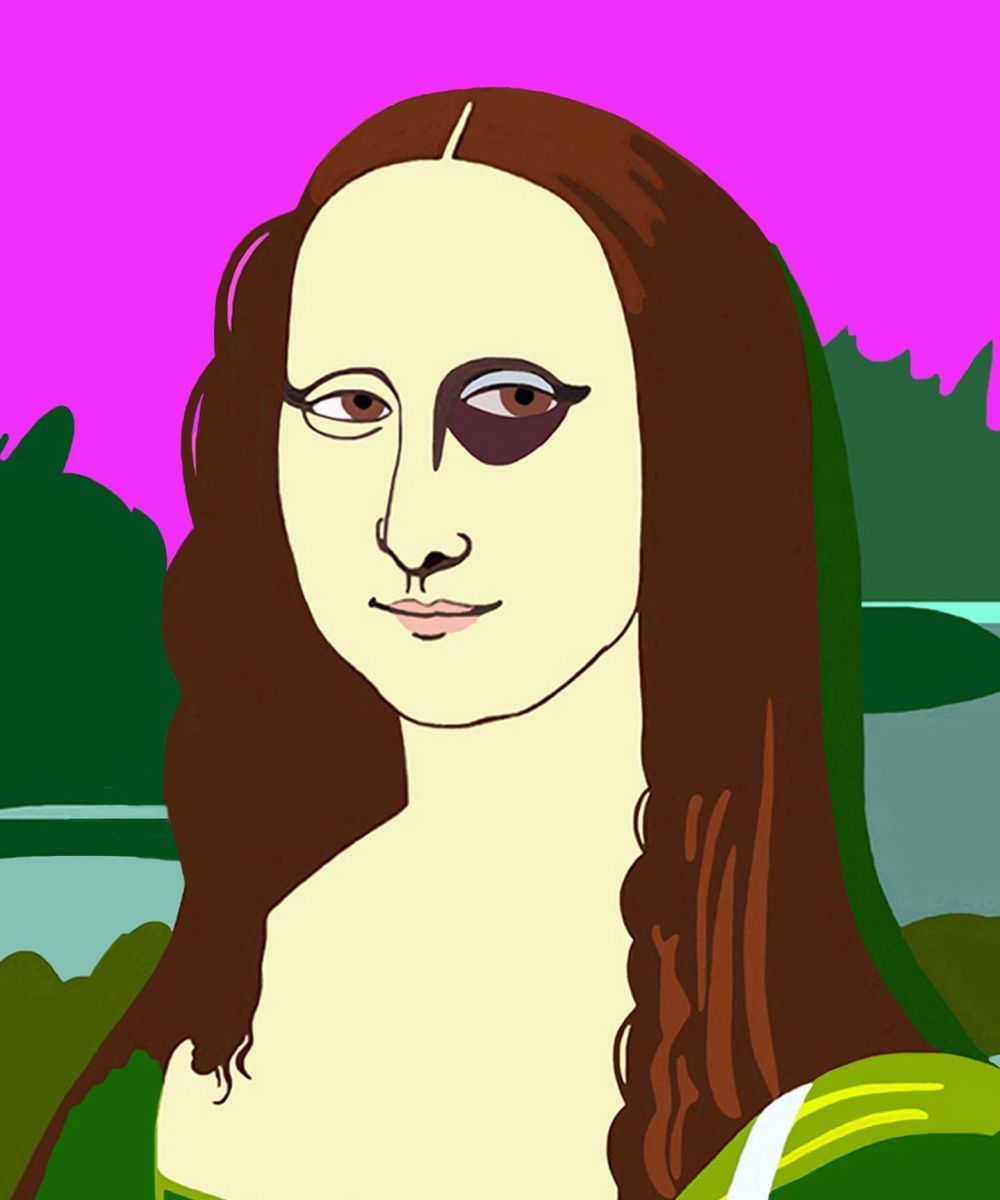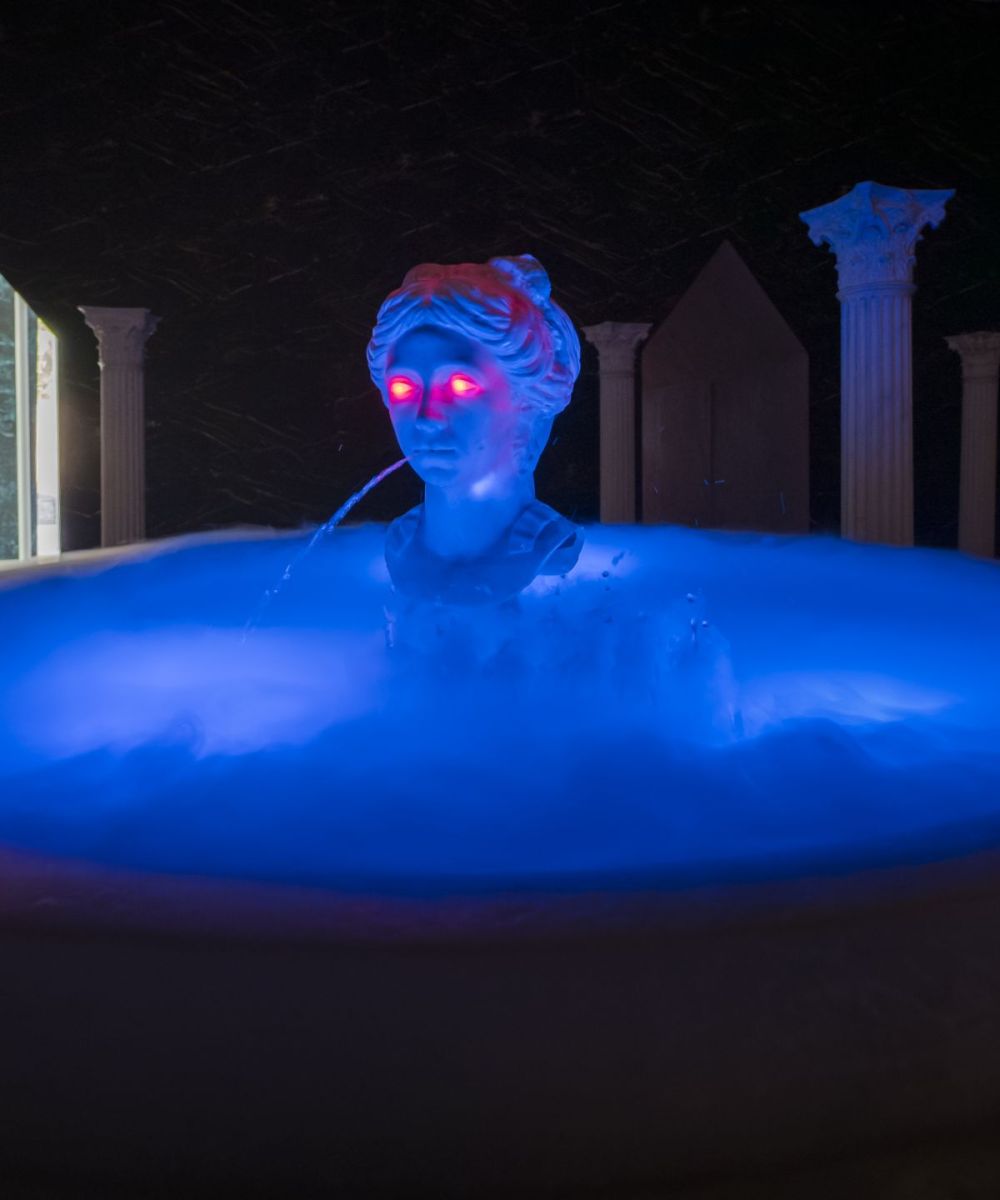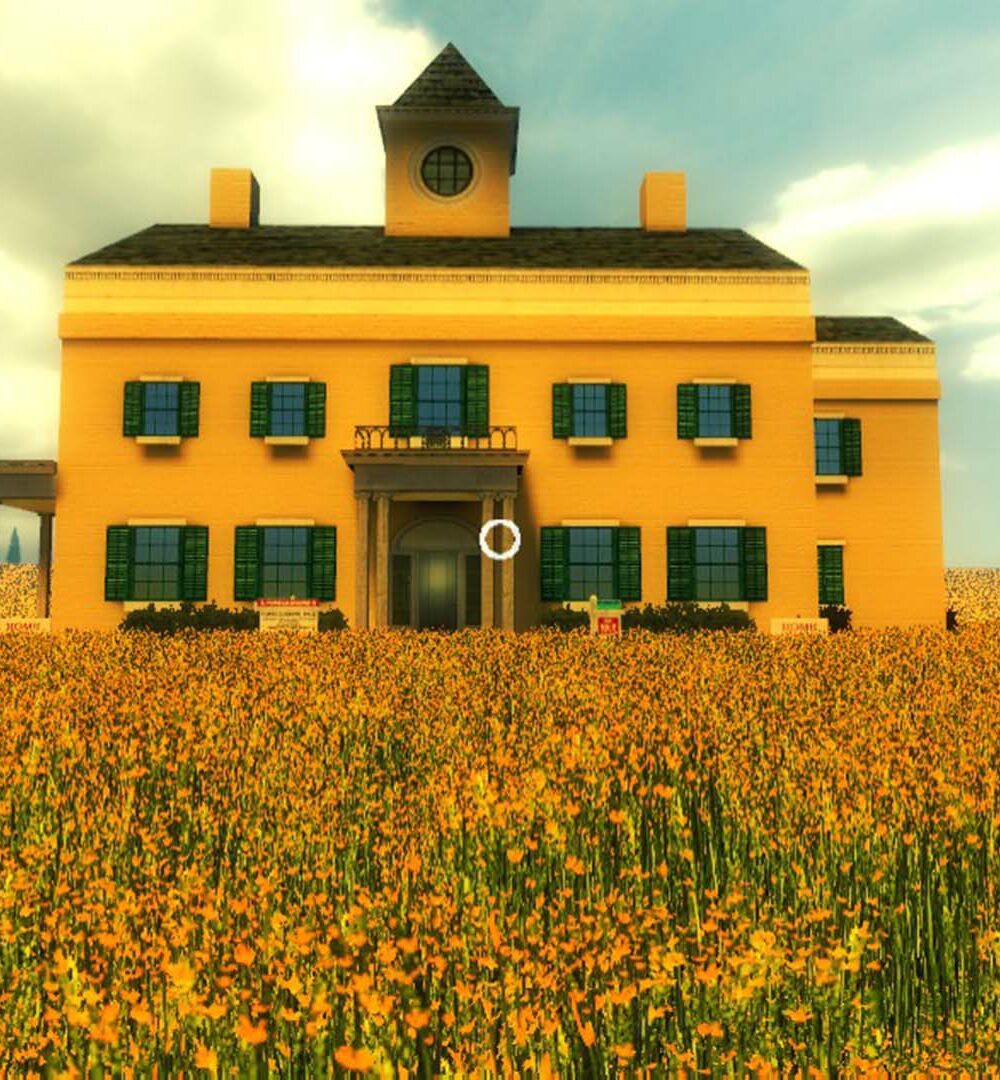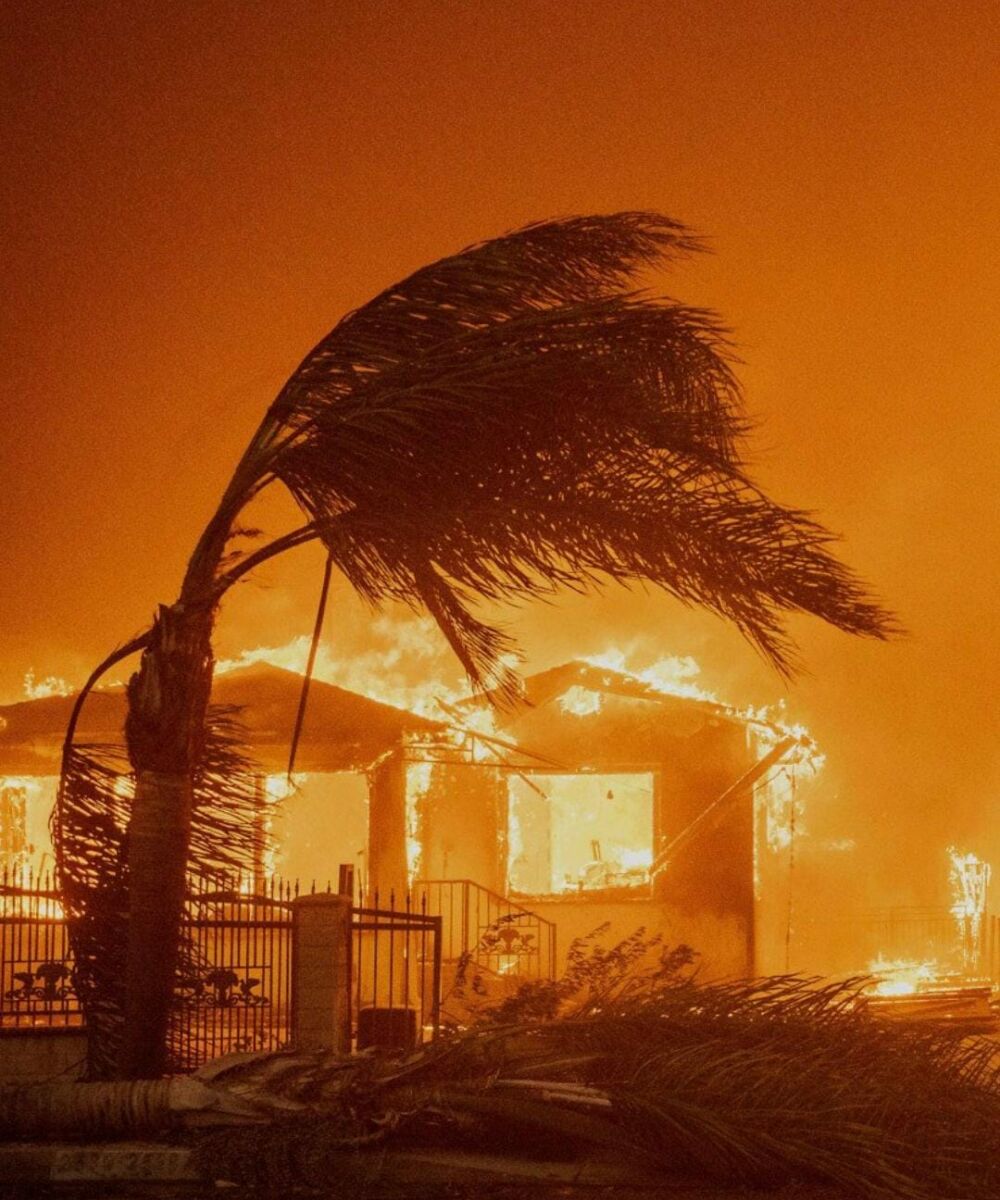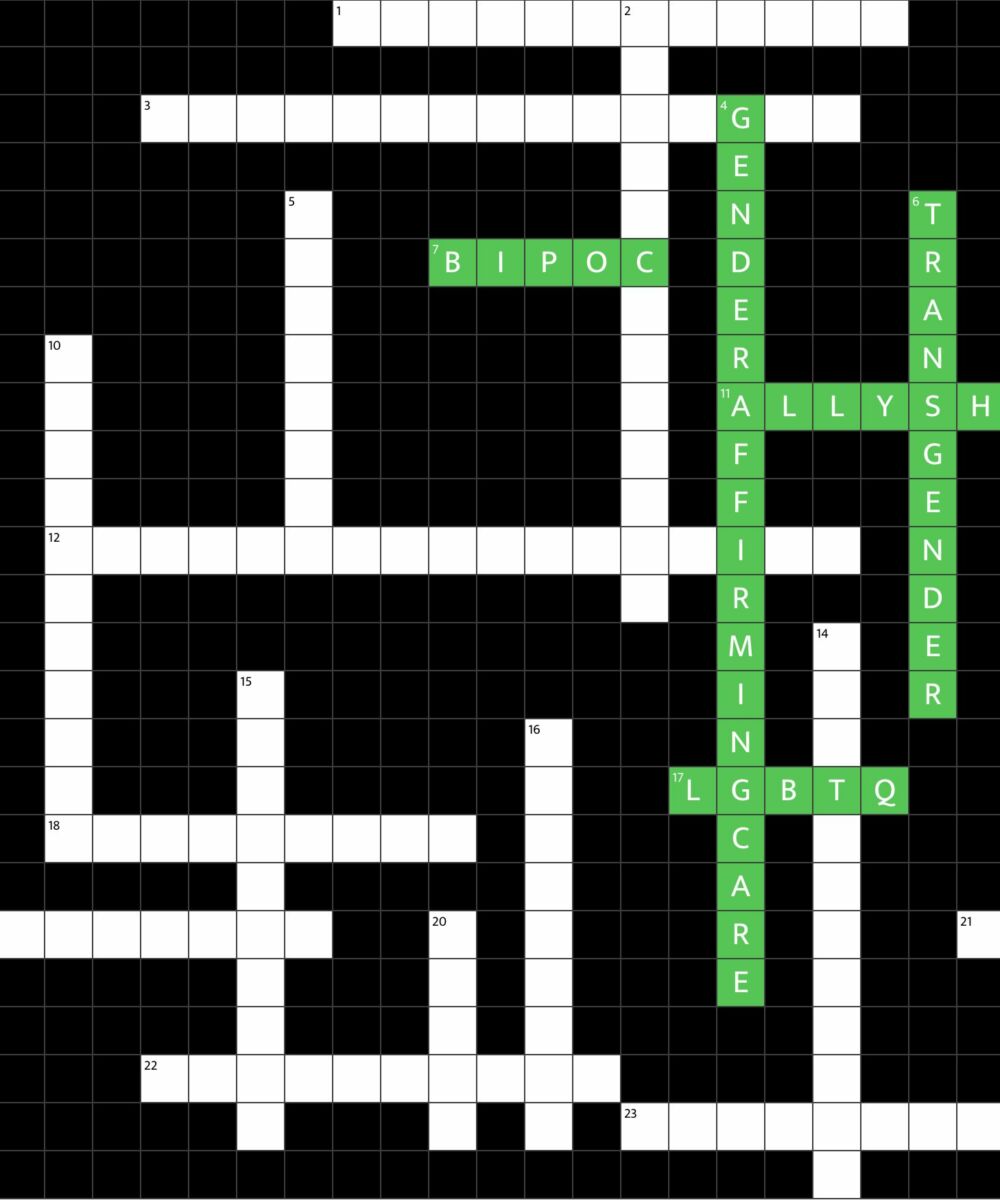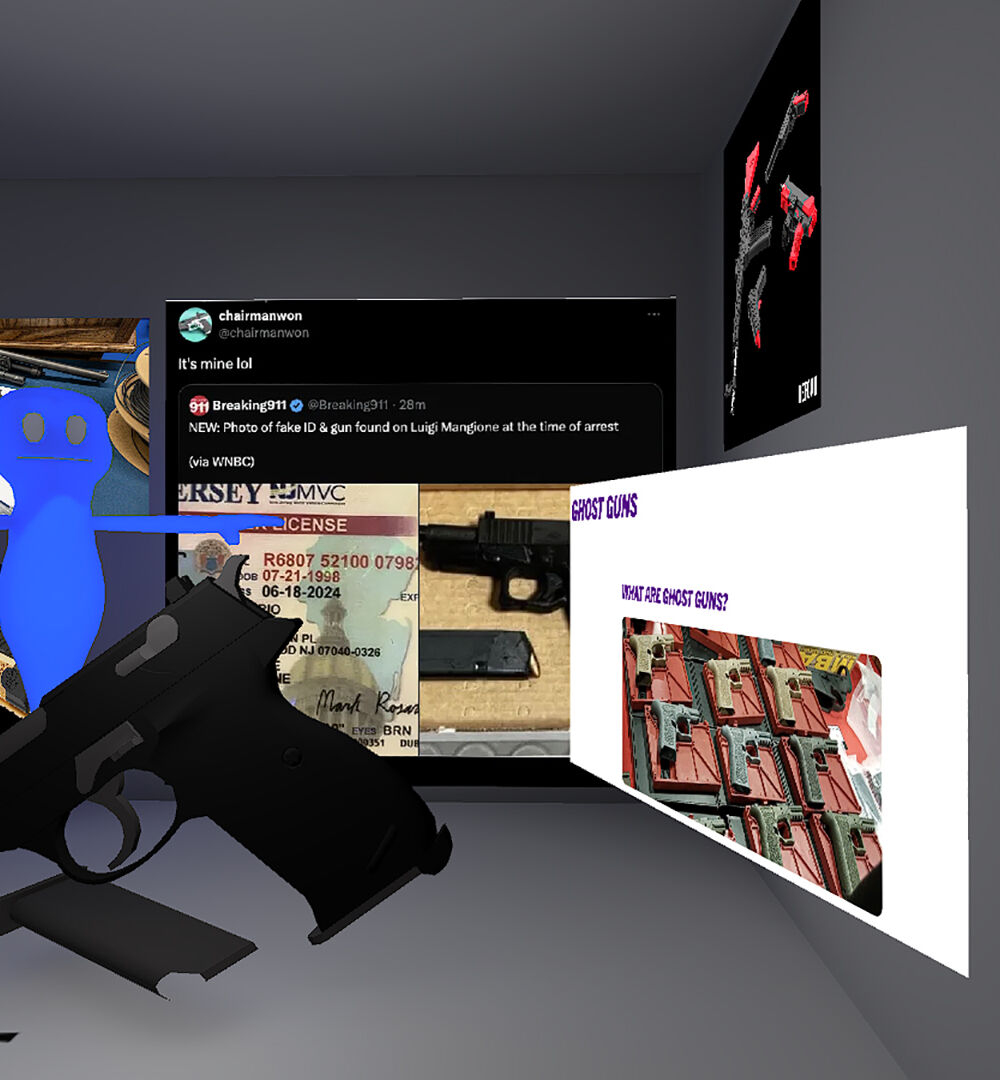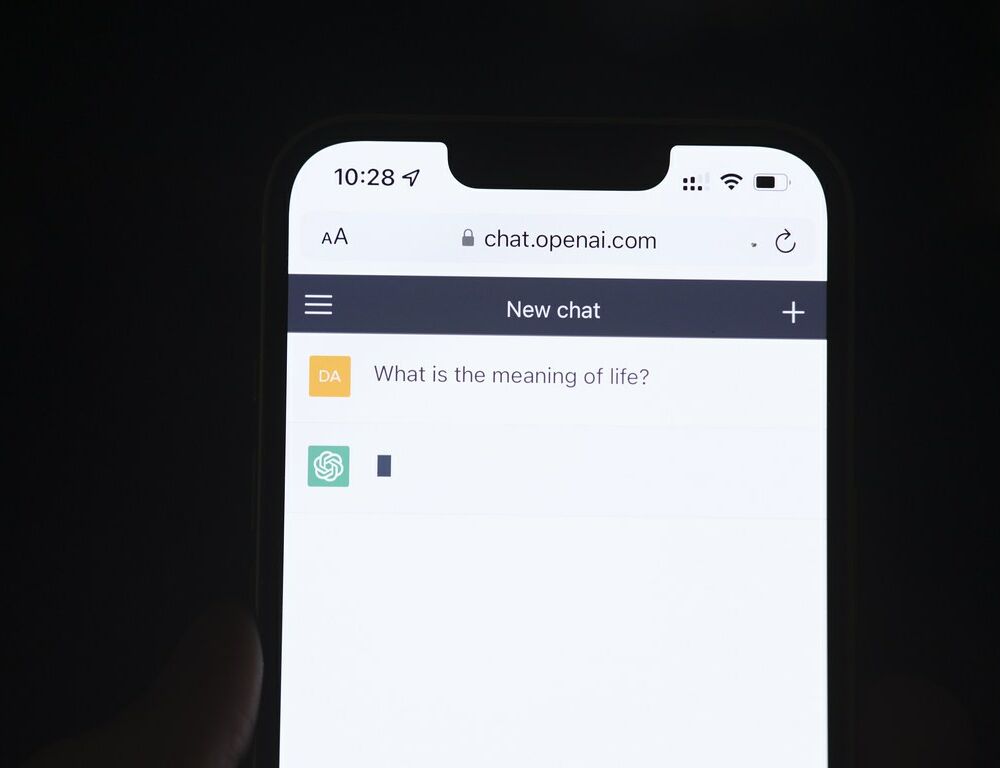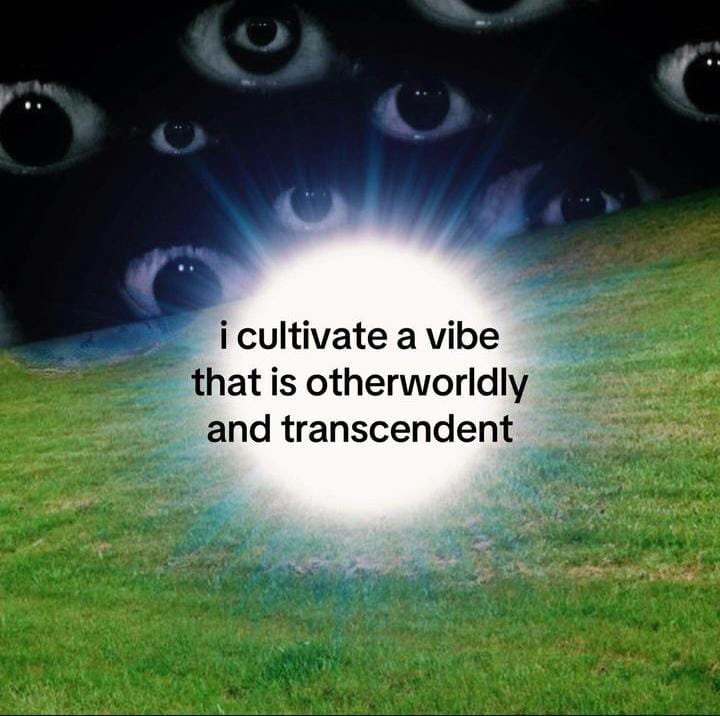A journey into the borderless art of Max Magaldi
by Alessandro Mancini
Max Magaldi was born in 1982; he began as a musician and drummer and today is a prominent artist in the field of digital arts and other forms of expression. In 2018, he started to experiment with digital device performances, combining music, contemporary art, and hacking on social networks, and began developing the concept of the sound mural. He has created sound and installation performances, and has exhibited both in Italy and abroad, in France, Greece, and Saudi Arabia. He has collaborated with renowned artists like Edoardo Tresoldi, Gonzalo Borondo, Studio Azzurro and Andrea Villa.
Co-founder of Off Topic, dynamic cultural hub of the city of Turin, since 2021 he has been part of Cubo Teatro, a collective of multimedia artists involved in contemporary theatre performance projects. In 2021, he also launched the Memissima festival, dedicated to meme culture, and of which he is the artistic director.
His interests are focussed on current affairs, social topics and politics, and over time, his artistic research has been directed towards creating installations and performances designed for public spaces. They are aimed at stimulating the public towards reflection and critical thought on important present-day topics like the migration tragedy, instruments of political propaganda, and our controversial relationship with social networks.
According to Magaldi, “As a musician I have created quite a range of niche and experimental projects. In fact, experimentation is the common thread throughout my artistic production. But, since I was 16 or 17, I have always organised festivals and events too, so you could say that I have lived on stage as well as behind the scenes. In 2013, when I was living in Sapri, I created a team with whom we put together music and street art, at a time when certain street artists were beginning to make their first moves towards contemporary art”.
Street art has had a strong influence on Magaldi’s perspective and style; he began to analyse the almost visceral relationship that artists have with public space, and attempted to replicate it through the point of view of sound: “Instead of creating a constructed wall, I make one out of sound: I create a public space out of sound so that the performance makes sense only in that specific place”. That is how the concept of “sound murals” was born.
Also at that time, when he was about thirty, one of his close friends became interested in electronic music: and that is how the project, The Drama, was born (American slang to indicate the drummer), but is also a play on words of the term “drama”. (Magaldi admits he loves inventing homophony). In this case, the “drama” was in reference to the migration tragedy, a subject that was strongly controversial at the time. “I had decided to create a series of performances that were based on that topic” explained Magaldi, “so I envisaged the first so-called sound mural dedicated to the port of Trieste, one of the largest oil hubs in Europe. On the other hand, the soundtrack was a kind of song whose lyrics were based on certain declarations by Daniela Santanché, the first Italian politician to use the expression ‘sink the boats’ to block the ‘hordes of invaders’”.
However, with this sound mural Magaldi completely changed the meaning of Santanché’s words, which, when heard while observing the images of the oil tankers entering the port, seemed to refer to the tankers not the migrants, playing with the intrinsic ambiguity of language: “Words change in meaning according to the place and context where they are pronounced”. To diffuse this sound mural subject, Magaldi decided to create a Facebook page entitled STOP Barconi, (Stop the boats) “Basically, for 2 months I worked to apparently spread Salvini propaganda: I relaunched the slogan shared by Salvini, who was the Minister of the Interior at the time, and then I started to publish memes about him, which in reality were parodies or caricatures aimed at him”. In just over two months the page had thirty thousand followers. Then two days before the European elections, Magaldi announced that for the first time, he would show a live transmission of the sinking of a boat full of migrants. The title of the transmission was Riportiamogli a Casa l’Oro: a play on words that, in Italian, sounded like “Send them back home”, generally used in reference to the migrants. “In realty, the transmission filmed an oil tanker entering the port of Trieste, mixed with images of the Niger Delta, with a soundtrack I had prepared using the words of Santanché”. The video was shared and commented with racist remarks by thousands of Salvini fans, who had no idea of what had been taking place: “I trolled them completely. From that moment, I removed my mask and the FB page was officially declared as a social experiment”.
Magaldi graduated with a degree in Communications Science in 2005: “In that year, what was to later revolutionise the world of communications simply didn’t exist: for example, there was no YouTube or Facebook. At that time, when I had just finished university, I had the impression that everything I had studied and experienced was crumbling under my feet. After all, I was a man of the 20th century attached to the concept of authorship and analysis, while the world was beginning to move forward focussed on speed and superficiality. I experienced a true cultural shock. So, when I began to discover memes on the first social bulletin boards or on 4chan, also used as a creative instrument, I was blown away. I thought that if I was truly going to let go of the 20th century, the only reason why I should be willing to engage would be in the name of total chaos and anarchy: and the world of memes is, in fact, a profoundly anarchic and uncontrollable world. In a certain way, through working with memes, I have made my peace with the present”. This was the moment when Magaldi’s great passion for memes was born, and in 2020 he decided to transform it into a festival, Memissima: “A festival that helps me study and keep up to date with what is new at the moment”. At the latest edition he awarded (TV personality) Gerry Scotti, with the Oscar for the “the most memed celebrity of the year”.
Continuing the common thread of The Drama, in January 2020, with the artist, Andrea Villa, Magaldi went to the island of Lesbos, which at that time hosted the largest refugee camp in Europe, at Mori, with terrible conditions and great suffering (twenty-two thousand migrants were crammed into a camp designed for only three thousand). He decided to create an installation with a strong emotional impact. The project was called Europe/YourHope (more homophony) which was set up on a site called Life jacket Graveyard: a kind of scrapheap where the island’s waste collection service discharged all the remains of clothing, shoes, deflated rubber boats and improvised lifebuoys abandoned by migrants as they reached land; mountains of garbage piled several metres high. On this site the artists built two columns from lifebuoy inner tubes to create a symbolic representation of the Pillars of Hercules, with a 48-hour soundtrack from a monitor broadcasting a speech by the Greek Prime Minister, Mītsotakīs, who spoke of human rights and equality, that were transformed into a dark version of Beethoven’s Ode to Joy. “The installation was aimed at making the public reflect on the oppression suffered by the migrants, inviting European public opinion to move beyond the ‘Pillars of Hercules’ of their diffidence towards others, and to react so that Europe could become a true land of hope for migrants”.
During the period of Covid-19, when the time the world spent in front of screens increased exponentially, Magaldi began to reflect on how the use and abuse of technological devices was changing our relationship with vice. This led to the project,Vices/Devices (once again a play on the homophony of the two words), a series of seven A/V installations in which the artist explored the relationship between technology and human behaviour. “Until thirty or forty years ago, to indulge in behaviour that was considered one of the seven capital vices, a person had to physically go to a specific place to commit that ‘sin’ – explained Magaldi – whereas today, thanks to our devices, we can hypothetically access anything at any time: this innovation has changed our relationship with vice and has created new transgressions”.
The first vice the artist focussed on was vainglory (pride): “This is something I experience personally and that I have felt the need to exorcize. Despite the fact that I am passionate about, and have worked extensively with social networks, at the same time, I have a distinct problem with using these instruments personally. I have always been accustomed to using them incognito or from a performance perspective, as in the case of STOP the Boats. On the other hand, when I have to speak about myself and what I do, I find it very uncomfortable”.
#Vices – Vainglory criticises our obsession for exhibiting ourselves and describing our lives every day on social media, transforming ourselves from our role as a passive subject to become the authors, screenwriters and directors of our own lives.
The first enactment of Vainglory was produced in December 2021 in the famous Petrella Theatre in Longiano, Forlì-Cesena. An orchestra was composed of a hundred and fifty phones and two hundred and twenty laptops, for which Magaldi selected content from a hundred and seventy different sources downloaded from social media; the users were all involved in different activities (dancing, preparing a recipe, teaching a tutorial, etc.). The devices lit up and provided the sound in the public space, while the dozens of social contents, manipulated by the artist, formed the soundtrack. In this way, the role of the theatre space was completely inverted: the public became the true protagonist of the production, while the stage remained empty. Magaldi described the scene: “During the performance, the public arrived from the rear; very gradually, the various devices were switched on, lighting up the stalls and gallery. The sense of the installation was to show that the masses are not composed of passive subjects but of constantly active creators: today, the public compulsively produces any and every type of content. For the first time in the history of humanity, we find ourselves in a period in which people tell their own stories or delude themselves that they are authors. We are in the era of self-narration. Apparently, there is no longer a need for an artist to describe society, because the public tells its own story”.
Andy Warhol sustained that in the future ‘everyone would have his 15 minutes of world fame’, but Magaldi does not agree. “Today, something different is happening: everybody thinks they will be famous forever, but in reality, this happens only within a restricted circle of people. We are all artists, creative talents, columnists, or at least, we think we are, and even if we have only fifteen followers, we produce this content for them, and we believe it makes sense to continue. We have all become artists and at the same time, our own public”.
Alessandro Mancini
Holds a degree in Publishing and Writing from La Sapienza University in Rome and is a freelance journalist, content creator and social media manager. Between 2018 and 2020, he was editorial director of the online magazine he founded in 2016, Artwave.it, which specializes in contemporary art and culture. He writes and speaks mainly about contemporary art, labor, inequality, and social rights.


